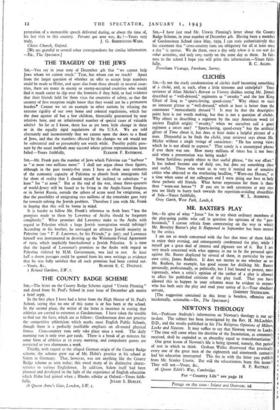THE TRAGEDY OF THE JEWS
SIR,—You say in your note of December 4th that "we cannot help Jews whom we cannot reach." True, but whom can we reach? Apart from the larger question of whether an offer to accept large numbers could be made to Hitler, and apart also from those already in neutral countries, there are many in enemy or enemy-occupied countries who would find it much easier to slip over the frontiers if they held, or had evidence that their friends held for them visas for countries of safety, so that the country of first reception might know that they would not be a permanent burden! Cannot we set an example to other nations by relaxing the extreme rigidity of our own home and colonial regulations, which bar the door against all but a few children, financially guaranteed by near relatives here, and an infinitesimal number of special cases of valuable adults? So far as I know, there has as yet been little change in these or in the equally rigid regulations of the U.S.A. We are told alternately and inconsistently that we cannot open the doors to a flood of Jews, and that the numbers affected by the changes we ask would not be substantial and so presumably not worth while. Possibly public pressure by the usual methods may succeed where private representations have
failed.—Yours faithfully, ELEANOR F. RATHBONE.
SIR,—Mr. Frank puts the number of Jews which Palestine can " harbour " as "at most two millions more." I shall not argue about these figures, although in the past twenty-five years I have so often seen estimates of the economic capacity of Palestine to absorb fresh immigrants fall far short of reality that I should myself be inclined to substitute "at least" for "at most." But at the end of the war, about three-quarters of world-Jewry will be found to be living in the Anglo-Saxon Empires or in Soviet Russia, outside the sphere of acute need for emigration, so that the possibility of emigrating two millions of the remainder goes very far towards solving the Jewish problem. Therefore I join with Mr. Frank in hoping that this will be borne in mind.
It is harder to follow Mr. Frank's reference to Arab fears "lest the pronises made to them by Lawrence of Arabia should be forgotten completely." What promises did Lawrence make to the Arabs with regard to Palestine which a large Jewish immigration would infringe? According to his brother, he envisaged an ultimate Jewish majority in Palestine (see "T. E. Lawrence, by his Friends," p. 593); and Lawrence himself was instrumental in drawing up the Weizmann-Feisal Agreement of 1919, which implicitly foreshadowed a Jewish Palestine. It is time that the legend of Lawrence's promises to the Arabs with regard to Palestine violated by H.M. Government, was laid to rest. At least half a dozen passages could be quoted from his own writings as evidence that he was fully satisfied that all such promises had been carried out. — Yours, &c., BLANCHE E. C. DUGDALE. r Roland Gardens, S.W. 7.






















 Previous page
Previous page